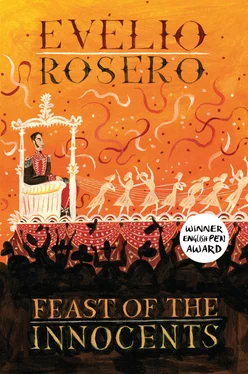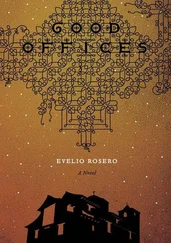Evelio Rosero
Feast of the Innocents
Help me to raise the ghost of Doctor Justo Pastor Proceso López, to unearth the memory of his daughters, from the day the youngest turned seven and the eldest was deflowered in the finca stables, up to the day of the doctor’s death, kicked by a donkey in the middle of the street, but speak to me too of the straying of his wife, Primavera Pinzón, sing of her unsuspected love, give me strength to seek out the exact dreadful day the doctor disguised himself as an ape, by way of an inaugural joke, resolved to surprise his wife with the first fright of the Black and White Carnival. What day was it? Feast Day of the Holy Innocents, day of practical jokes, day of water and purifying baths, December 28, 1966, six in the morning, a fine mist still refusing to abandon the doors and windows of the houses, wrapping itself like white fingers around the willow trees that marked out the street corners; every soul slept, except the doctor’s — pacing about his spacious consulting room, trying on a realistic ape costume he had ordered to be sent in secret from a famous shop in Canada: he had already donned the part of the ape corresponding to legs and trunk, his arms swelled with muscles and fur, coarse fur, authentic orangutan, and he had still to put on the enormous hairy head he clasped hesitantly against his heart.
With the ape head in his hands he went to look at himself in the mirror of the guest bathroom, on the ground floor of his three-storey house, but instead of confronting his yellow, fifty-year-old face once more in the mirror he preferred to cram it straight into the velvety interior of the black ape head, and what he encountered made him almost happy, on perceiving a perfect ape, the reddened eyes — a ruddy gauze covered the eyeholes, so that the doctor’s eyes seemed reddened by rage and he saw everything as if through red clouds — and he was further seduced by the ape teeth that protruded, excessively and dangerously pointed, and then the coat again, which could even be called genuine gorilla fur; he even thought he caught a lingering whiff of ape, and that smelly certainty, of male ape, made him sweat with all the dejection of a male human; he said “hello,” and a mechanism in the ape’s throat immediately transformed the greeting, distorted it, made it sound guttural, a simian grumbling or threat, something like hom-hom, which alarmed the doctor for a second, believing there was perhaps a real ape in his house, or inside himself — could be, he thought, ashamed.
He was not used to playing jokes like this. In fact, he did not joke with anyone or about anything in that city of his which was one perpetual prank, where his forebears had lived and died laughing at themselves, in that country of his which was yet another atrocious joke, but a joke all the same, his city parcelled up between hundreds of great and small pranks that inhabitants suffered on a daily basis, whether they liked it or not, naive jokes and obscene ones, lewd jokes and wry ones, the now-slumbering inhabitants who perhaps at this very moment were waking in their beds dismayed to be facing not just the joke of life, but the pranks of Innocents’ Day, especially the soakings, when everyone in Pasto was free to douse neighbour, friend and enemy with a bucket of cold water, a hosepipe or water bombs — the hard balloons thrown head-on or from behind, with or without the target’s consent — and the other jokes too, accepted with resignation, the tricks and awful pranks to which they all would be subjected, from the wisest to the most ingenuous, young and old, as prelude to the Black and White Carnival.
One December 28, Alcira Sarasti, wife of his neighbour Arcángel de los Ríos, invited him to an Innocents’ Day feast at her house and served some surprise empanaditas , filled with cotton wool, which he ate, the only innocent fool, greedily gullible, unlike the rest of the guests, later suffering from an excruciating stomach ache the entire night, what poison was that cotton wool soaked in? An emetic? An astringent? Homemade cyanide? The pious Alcira Sarasti had dreamed up that mockery made to measure and just for him — he was a tall and dignified man, but podgy and self-important as a piglet, his prominent belly betraying what could otherwise very well be an attractive fifty-year-old body; no doubt about it, that pious woman has hated me ever since I said God was another of man’s bad inventions, he thought.
Frankly, he loathed pranks and pranksters, or was he afraid of them? He considered them peculiar beings who came along to disturb the peace; in general they were men and women who displayed some perfidious facial tic: a half-closed eye, for example, at the precise moment of the prank — or the jeer, which is the same thing, there is no prank without jeering for these unimaginative people, he thought — they were men and women who must have undergone some trauma in childhood, marked out by a certain savage furrowing of the brow, that narrowing of the eyes, the tongue moistening the sibylline lips, the suitably malign voice, because pranks fly close to slander, the wind laden with accusatory lies, a prank — or the jeering in it — could turn out to be more merciless than a shock, any shock was preferable to any prank, he thought. Yet, nevertheless, months earlier he too had started to plot his prank, the ape joke, just like everyone else in Pasto, because each person planned their prank during the year to put into practice on December 28, and then to perform in all its variations over the days of the carnival, January 4, 5 and 6, to keep it up, show it off, recreate it in the frenzy of fun, talcum powder and streamers, monumental floats, rivers of aguardiente and loves, both known and unknown, of the Black and White Carnival.
The simple prank of the simple ape exalted him to the point of freeing him to imagine himself an authentic, terrifying ape, in the early hours of that December 28, waking his wife and two daughters with his black presence and enraged eyes and simian leaps, frightening them out of bed one after another, ending up chasing them all over the house, trampling furniture and toppling ornaments and throwing the order of things into chaos as only an ape can do, exactly as he would never have done had he not found himself disguised as one, scaring the two girls possibly to the point of tears — I couldn’t help it, Floridita and Luz de Luna, forgive me — and then, in the intimacy of the master bedroom, when everything signals the end of the prank and he makes as if to remove his costume, taking his wife, but taking her by force, the sweetest force, something that had not happened in years; standing before the mirror, Doctor Proceso was once again startled at himself, at the idea, the spectacle of envisaging himself on top of his own wife, disguised as an ape, struggling to subdue her by sweet force — what sweet force? — that sweet force had long since disappeared and he wondered whether it might have been better to have drunk a double shot of aguardiente well beforehand, in order to embark on this absurd, truly idiotic prank, which even included conjugal rape, he was out of his mind — what was the matter with him? — he and his wife had nothing to do with one another, either in bed or out of it, on earth or in heaven: the most excruciating boredom, heavy with hatred, had hovered over them for ages. Thinking of that, in front of the mirror, he beat his chest as apes tend to do out of aggression, but he did it so slowly and pitifully that the ape in the mirror looked funny and then sad, he thought, a shit-scared ape.
But the ape rallied, now imagining leaving his house to ingratiate himself with the world, via the shock of his joke, embracing people he did not usually acknowledge, not through silly pride, but because he had forgotten about the world since — recently graduated from medical school, at twenty-five years of age — he had resolved to use his spare time to write the definitive and genuine biography of the never-so-misnamed, so-called Liberator Simón Bolívar.
Читать дальше












